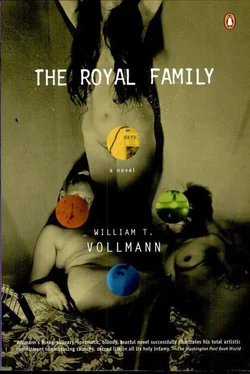William Vollmann - The Royal Family
Здесь есть возможность читать онлайн «William Vollmann - The Royal Family» весь текст электронной книги совершенно бесплатно (целиком полную версию без сокращений). В некоторых случаях можно слушать аудио, скачать через торрент в формате fb2 и присутствует краткое содержание. Год выпуска: 2000, ISBN: 2000, Издательство: Penguin, Жанр: Современная проза, на английском языке. Описание произведения, (предисловие) а так же отзывы посетителей доступны на портале библиотеки ЛибКат.
- Название:The Royal Family
- Автор:
- Издательство:Penguin
- Жанр:
- Год:2000
- ISBN:9780141002002
- Рейтинг книги:5 / 5. Голосов: 1
-
Избранное:Добавить в избранное
- Отзывы:
-
Ваша оценка:
- 100
- 1
- 2
- 3
- 4
- 5
The Royal Family: краткое содержание, описание и аннотация
Предлагаем к чтению аннотацию, описание, краткое содержание или предисловие (зависит от того, что написал сам автор книги «The Royal Family»). Если вы не нашли необходимую информацию о книге — напишите в комментариях, мы постараемся отыскать её.
The Royal Family — читать онлайн бесплатно полную книгу (весь текст) целиком
Ниже представлен текст книги, разбитый по страницам. Система сохранения места последней прочитанной страницы, позволяет с удобством читать онлайн бесплатно книгу «The Royal Family», без необходимости каждый раз заново искать на чём Вы остановились. Поставьте закладку, и сможете в любой момент перейти на страницу, на которой закончили чтение.
Интервал:
Закладка:
The lock opened on the fifth bounce. He stepped into the greasy light.
BOOK II. Irene
“Generous, chivalrously generous!” Keller assented, much touched. “But, you know, prince, it is all in dreams, and, so to say, in bravado; it never comes to anything in action!”
DOSTOYEVSKY, The Idiot (1869)| 15 |
To say that there were times when Henry Tyler knew his life was ashes would have been an understatement in the English manner. People who possess no backbones whatsoever (and preferably no minds, either) can be most easily pleased, like children eating ice cream; where the ice cream money comes from, and under what conditions they receive it — to say nothing of the sanguinary destiny of even the most miraculous vanilla-chocolate cow — never breaches the barriers of their victorious vacuity. Next case: Roman senator types, so prodigiously favored or ossified with backbones that they can scarcely sit down, constitute the second most fortunate regiment of souls; when events fail them, pride carries on, and when the latter dies they will probably succeed in staggering a few steps farther, fortified by philosophic resignation, until they fall at last into their open graves, muttering: At least I did the right thing. — Tyler, like most of us, had not so much claimed membership in as been claimed by the third group, comprised of those who know, and are shamed, but do not or cannot act. If the grim first half of that black Book (rarely to be met with in Tenderloin hotels because its pages were long ago cannibalized for rolling papers) truly knows whereof it speaks, why, then Tyler’s own losers’ club got inaugurated in the days of Cain and Abel, whose parents, like evicted junkies who boast that even now they can wrap the landlord around their grimy little fingers, had continued to insist that they could still get right with God. Why, sooner of later He’d have to forgive them! It just wasn’t Christian for Him to go on holding a grudge like that. After all, they’d only eaten one apple — they hadn’t even finished it, if you consider the core, which had borne a worm or serpent or something (and wasn’t that God’s fault, to provide them with rotten fruit?); no, ladies and gentlemen of the jury, that apple had scarcely been worth saving. (Thus spake the whore who’d stolen a mere twenty from Tyler’s pocket while he was on Mason Street calling his answering machine.) Remembering Eden’s swanky landmarks — the silvery river of vodka, the meadows of opium poppies springing white and orange in a nutmeg breeze, the Chinese-style zen rock garden whose sparkling pebbles were all refined crack cocaine — Adam and Eve could scarcely believe that their happy pre-Lapserian eternities had become dust. Anyhow, they weren’t damned; they were on parole. Nothing was final. If I put a gun to my head, I know perfectly well that even after I’ve pulled the trigger I can always duck out of the way or even blow the bullet back down the barrel with a cheery gust of breath, because it was I who initiated the cause; what injustice if I couldn’t control the effect! — No matter, the expelled spouses said to one another; He could come talk to them anytime and they’d help Him see the light. (Call this no backbone at all, or else backbone so well crystalized as to occupy the cranial cavity.) But Adam and Eve’s boys, sullen, lice-infested, and pallid from too many seasons of hunting blind-fish in the familial cave, never owned that solace. Imperfection had not originated with them, nor had responsibility. They were cursed without meaning or recourse. Cain, unable to believe this at first, crept near Eden as soon as he was grown, and found only an angel with a flaming sword who threatened him with death. Cain wanted to know why. Still unable to believe in reality, prepared to bow and beg to make life other than it was, Cain somehow retained in his mind the image of the Hall of Justice in San Francisco, where a steady or lucky customer may well meet with the expressionless lordliness of the white-moustached, paunchy, black-uniformed guardian of the entrance, who stands with his arms at his sides while Cain, the man with a problem, explains and explains. Finally, in a clear and even friendly voice, the guardian settles everything: Go to Room 101 tomorrow. That’s really the best way. — Okay, thank you, says the man rushing furtively away. — Cain was certain that there must be a Room 101 thereabouts, within which mercy would be served on little plates, glistening like slices of fresh-killed fish. And, although he never would have thought himself capable of doing this, he fell down on his knees before the angel and bowed his head. The angel struck him a glancing blow with his sword, and Cain’s garments burst into flames. He rolled in the dust until the fire was quenched, cupped mud on his burns, then rose and again uttered the word: Why? — It has nothing to do with you or me, replied the angel. But understand this, boy: you’re going to be punished as long as you live. Automatic bench warrant. Now I’m going to count three. If you’re not running back to your cave by then, I’m going to burn your legs off. Don’t ever come back here. One… Two… — Cain told his younger brother everything. — Maybe it isn’t the same for you, he said. Maybe God likes you. I’ll show you where the place is. Then you can ask the angel to take pity on our family. — But Abel had already made up his mind not to tempt wrath with more impulsive sallies. Hadn’t they been warned? He whispered to his brother that he was afraid because he was still too little, that he couldn’t run quickly, but the truth, which he had expressed in the language of expediency only because that would produce the best effect upon his brother, was that he actually accepted lifelong submission as a moral principle. Who was correct, then; who was exemplary — Cain or Abel? I don’t care, as long as the angel wouldn’t let anyone speak. (By stating the matter thus, I fall perhaps a shade on Abel’s side, being unconvinced that his visit to the the gates of Eden would have been any more pleasant than for Cain.) — Enough of all this. Let’s just get on with it, as Tyler’s proudly impatient brother John would have said. — History with its taints, reverberations, irrevocable deeds and preexisting conditions may temporarily explain how a soul finds itself shackled, or not, but, while questions of how may be resolved to any degree of satisfaction, questions of why remain unanswered, merely slimed over by arbitrariness. Do you believe in original sin? It seems awfully unfair, and ultimately inexplicable. For Eden, take for instance the squiggles of light on the sunny dance floor of Pearl Ubungen’s Tenderloin studio, where Pearl, pretty and a little famous, sat with her baby in her lap saying tatatatatatititi and her dancers’ obliging heels going bimbimbimbimbimbimbimbim. They were rehearsing for some “event.” A church bell tolled in the tower. In the sunken courtyard, barefoot Asian children played. Then came the fence, and then came outside where a shivering man in a hooded sweatshirt slowly urinated in his trousers, whispering obscenities. Where did he come from? Why did he stink? Why were he and the children, separated only by that fence through which each party could see the other, clothed in such different fortunes? — To put a point on it, Abel prayed timidly to a God Whom he feared, of Whom he expected nothing — correctly, as we know from the tale’s round words, for God declined to protect him. As for Cain, he abandoned himself to anger and crime. He couldn’t kill God or the angel, so he killed Abel. Somewhat wanting in backbone that murderer was, too, for he pleaded innocent, just like any cheap pimp who’s gotten busted. But grant him this: In the end he did at least wear his Mark with defiant pride, and set out most adventurously to take up housekeeping with Lilith’s daughters and other whores in the Land of Nod, which I’ve always assumed was the place that heroin addicts go to, somewhere far past Jackson Street’s ideograms white and red on different colored awnings, somewhere out of Chinatown, maybe behind the Green Door Massage or in the Stockton tunnel or even Union Square where a red substance resembling Abel’s blood offered itself for purchase in the windows of Macy’s. And Cain, I read, begat Pontius Pilate, who begat firstly innocent bystanders, and secondly good Germans, and thirdly Mr. Henry Tyler, that newly ageing lump of flesh with the same stale problem of an irremediable spiritual impotence — nay, rottenness — of which he had not been the cause and for which there could be no solution. Acquiescence would render him more contemptible than he already was, and quite possibly doom him — I cite the precedent of Abel — while backbone would get him into trouble just as it had Cain. And yet Tyler said to himself: Someday I want to show backbone. I want to do something daring, good and important, even if it destroys me. — And he waited to be called to that worthwhile thing. — Sometimes he saw the narrow face of an angel opening to utter languages which he could not speak, enmeshing her words in that crazy metal spiderweb of ceiling which characterizes certain fancy poolhalls. He wanted to believe in these annunciations sufficiently to act, but the difficulty was that such backbone-showing demanded legal if not biological incest, for Tyler’s angel was his Korean sister-in-law, Irene, who, not beautiful but dear, came to him for help with all her marital problems because she knew him to be on her side. Sometimes she kissed him on the lips.
Читать дальшеИнтервал:
Закладка:
Похожие книги на «The Royal Family»
Представляем Вашему вниманию похожие книги на «The Royal Family» списком для выбора. Мы отобрали схожую по названию и смыслу литературу в надежде предоставить читателям больше вариантов отыскать новые, интересные, ещё непрочитанные произведения.
Обсуждение, отзывы о книге «The Royal Family» и просто собственные мнения читателей. Оставьте ваши комментарии, напишите, что Вы думаете о произведении, его смысле или главных героях. Укажите что конкретно понравилось, а что нет, и почему Вы так считаете.












